Introduction
Sometime ago ecommerce marketing automation tools were once just a part of your marketing stack, but now they're truly essential. These tools do more than simply send automated emails and social media posts. They create immersive, real-time, personalized experiences for your customers that can't be replicated manually.
From small businesses looking to accelerate expansion or a large enterprises looking to refine their ecommerce marketing automation strategy, marketing automation tools can streamline processes and drive growth. They use data and artificial intelligence to make informed decisions, do more with less, and ultimately improve your ROI.
As per reports from Forrester, by 2024, over 77% of companies are expected to adopt some form of marketing automation, with ecommerce brands leading the charge. Furthermore, a research study from Salesforce states that these tools can boost efficiency, streamline workflows, and even increase conversion rates by up to 14.5%—yes, really!
This guide will introduce the top 10 ecommerce marketing automation tools for 2024, from platforms that personalize customer interactions and streamline content creation, to robust solutions that offer in-depth analytics and multi-channel campaign management.
But before that let's have a sneak peek into ecommerce marketing automation and its concepts.
What is Ecommerce Marketing Automation?
At its heart, ecommerce marketing automation is like having a super-smart robot friend who takes care of all the repetitive marketing tasks. From sending emails to personalizing offers, it's all about making life easier. This robot is incredibly clever, using data to make decisions that help sell more, without you having to lift a finger.
Benefits of Ecommerce marketing automation
Let's see some of the benefits of ecommerce marketing automation:
Enhanced customer engagement: Imagine talking to every customer personally. Automation makes that a reality without you actually having to do it.
Improved sales and conversion rates: It's like having a salesperson who knows exactly when and how to close the deal, online.
Time and cost efficiency: Do more in less time. Save money by automating tasks that would otherwise require a team of people.
Personalization at scale: Ever dream of creating a unique shopping experience for every customer? Now it's possible.
Top 10 Ecommerce Marketing Automation Tools of 2024
In this section we'll look at a brief overview of, the pros, cons , and features of the top 10 ecommerce marketing automation tools in 2024 :
Tool 1: BotPenguin
BotPenguin provides chatbot solutions tailored for ecommerce businesses, offering features like AI-powered chatbots, pre-made templates, drip campaigns, and seamless integrations with over 60 native platforms including CRM and payment gateways.
The pricing structure includes a free Baby plan with 100 conversations per month, a King plan with 1,000 conversations, and an Emperor plan with unlimited conversations.
Pros
Let's look at the pros of BotPenguin, one of the leading ecommerce marketing automation tools:
Reasonable pricing tiers catering to different business needs
AI-powered chatbot for personalized conversations
Pre-made templates for quick setup
Drip campaign functionality for automated marketing
Extensive integrations with CRM and payment gateways
Pricing
The pricing plan is as follows:
Baby Plan: 100 conversations per month (Free)
King Plan: 1,000 conversations per month
Emperor Plan: Unlimited conversations
Best Cases
Best suited for the following:
Small to medium ecommerce businesses looking to enhance customer interactions
Businesses seeking to automate customer support and marketing efforts
Companies aiming to streamline sales processes and improve user experience
Tool 2: HubSpot
HubSpot is a comprehensive ecommerce marketing automation customer platform that offers a suite of tools for sales, service, marketing, and content management.
It provides a centralized solution for businesses to manage their customer interactions and marketing efforts effectively.
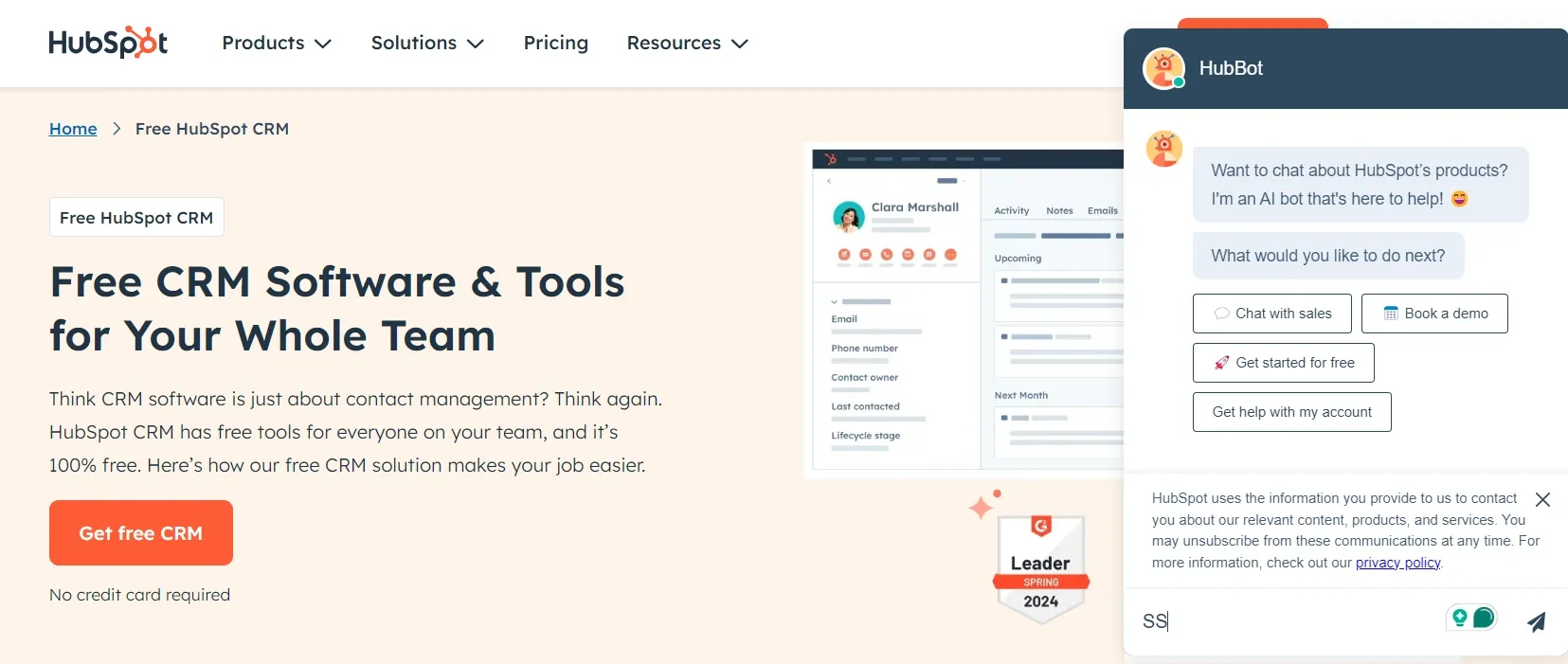
Pros
Let's look at the pros of HubSpot, one of the leading ecommerce marketing automation tools:
All-in-one platform for marketing automation
User-friendly interface
Powerful CRM system
Extensive customization options
Integration with other tools and platforms
Cons
The following are the cons:
Higher pricing compared to some competitors
The steeper learning curve for beginners
Limited advanced features in the basic plans
Pricing Details
HubSpot offers a tiered pricing structure based on the features and services you require. The pricing plans include a free version with basic features, as well as paid plans starting from a reasonable monthly fee. The higher-tier plans unlock more advanced features, such as advanced automation workflows, custom reporting, and A/B testing capabilities.
Best Use Cases
HubSpot is an ideal solution for ecommerce businesses looking for an all-in-one platform to streamline their marketing automation efforts. It is particularly suitable for businesses that prioritize personalized communication with their customers, data-driven decision-making, and seamless integration with other tools.
HubSpot can help businesses of all sizes improve their marketing strategies, track customer interactions effectively, and drive sales growth through ecommerce marketing automation.
Tool 3: Mailchimp
Mailchimp is one of the well-known ecommerce marketing automation tools. It enables users to create targeted campaigns, automate customer journeys, and analyze campaign performance through detailed reports.
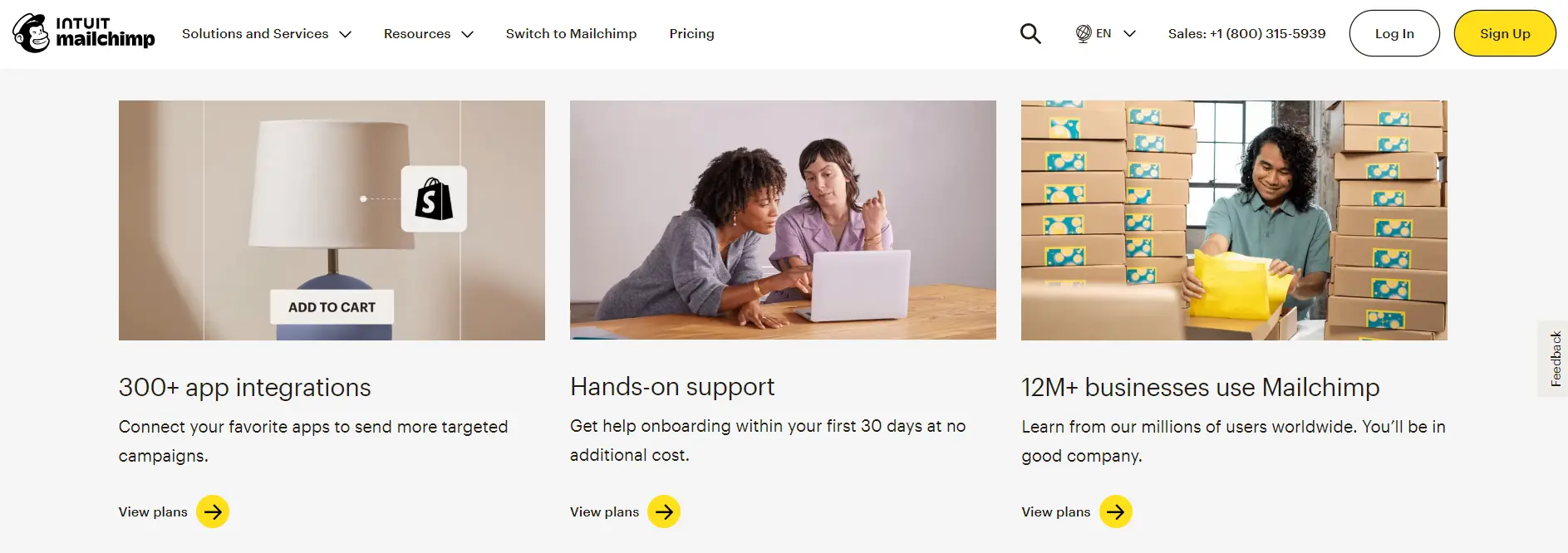
Pros
Let's look at the pros of MailChimp, one of the leading ecommerce marketing automation tools:
Intuitive interface: Mailchimp is known for its easy-to-use platform, making it simple for users to navigate and set up campaigns.
Automation options: With features like audience segmentation and drip campaigns, you can automate your marketing processes efficiently.
Integration capabilities: Mailchimp easily integrates with other ecommerce platforms, allowing seamless data transfer and campaign management.
Cons
The following are the cons:
Limited features in the free version: While Mailchimp offers a free plan, it has limitations on features and audience size.
Pricing can add up: As your subscriber list grows, the pricing tiers of Mailchimp may become more expensive compared to other tools.
Design flexibility: Some users find the design options limited compared to other platforms, which can be a drawback for those looking for more customization options.
Pricing details
Mailchimp offers various pricing tiers based on the number of subscribers you have. The pricing starts from a free plan for up to a certain number of subscribers and goes up as your list grows. Additional features like advanced segmentation and testing capabilities are available in higher-priced plans.
Best use cases
It is a great tool for those starting out with email marketing and ecommerce marketing automation, as it offers an intuitive platform with essential features to help you grow your online business. Additionally, businesses looking to streamline their customer communication and engagement will find Mailchimp a valuable asset in their marketing toolkit.
Tool 4: ActiveCampaign
ActiveCampaign is among the well-known ecommerce marketing automation tools. It offers a range of automation features, CRM functionality, and email marketing tools to help businesses engage with their customers effectively.
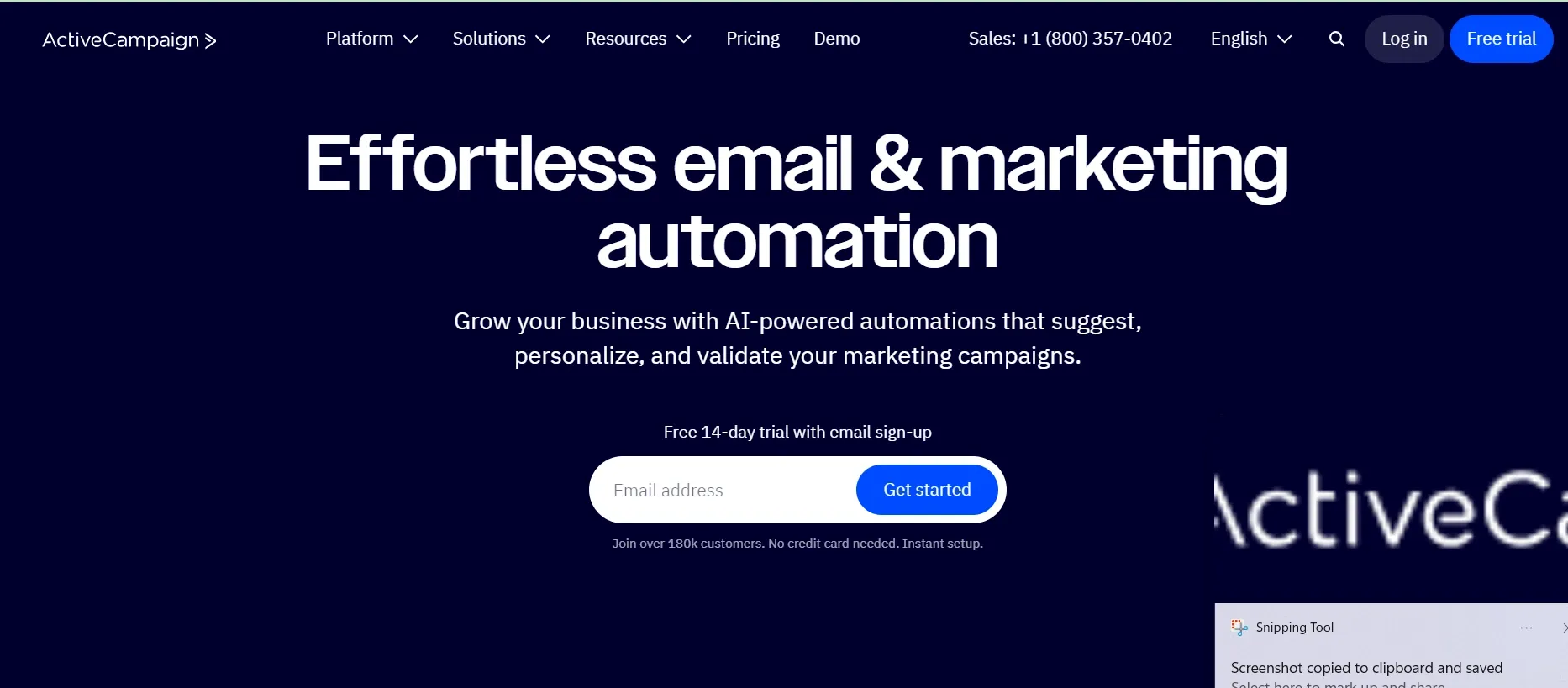
Pros
Let's look at the pros of ActiveCampaign, one of the leading ecommerce marketing automation tools:
Robust automation workflows
Integrated CRM system
Personalization options for campaigns
Cons
The following are the cons:
Complexity may be overwhelming for beginners
Pricing can be higher for advanced features
Pricing Details
Starting from a basic plan with essential features to more advanced plans with additional functionalities, you can choose a plan that fits your budget and requirements.
Best Use Cases
ActiveCampaign is ideal for businesses looking to automate their email marketing campaigns, personalize customer interactions, and track conversions effectively. It is particularly beneficial for ecommerce businesses that seek to segment their audience, target specific customer groups, and drive sales through strategic marketing efforts.
Tool 5: Omnisend
Omnisend is a specialized ecommerce marketing automation platform that focuses on omnichannel marketing strategies. It offers features like email marketing, SMS campaigns, and automation workflows to help businesses engage with customers across multiple channels.
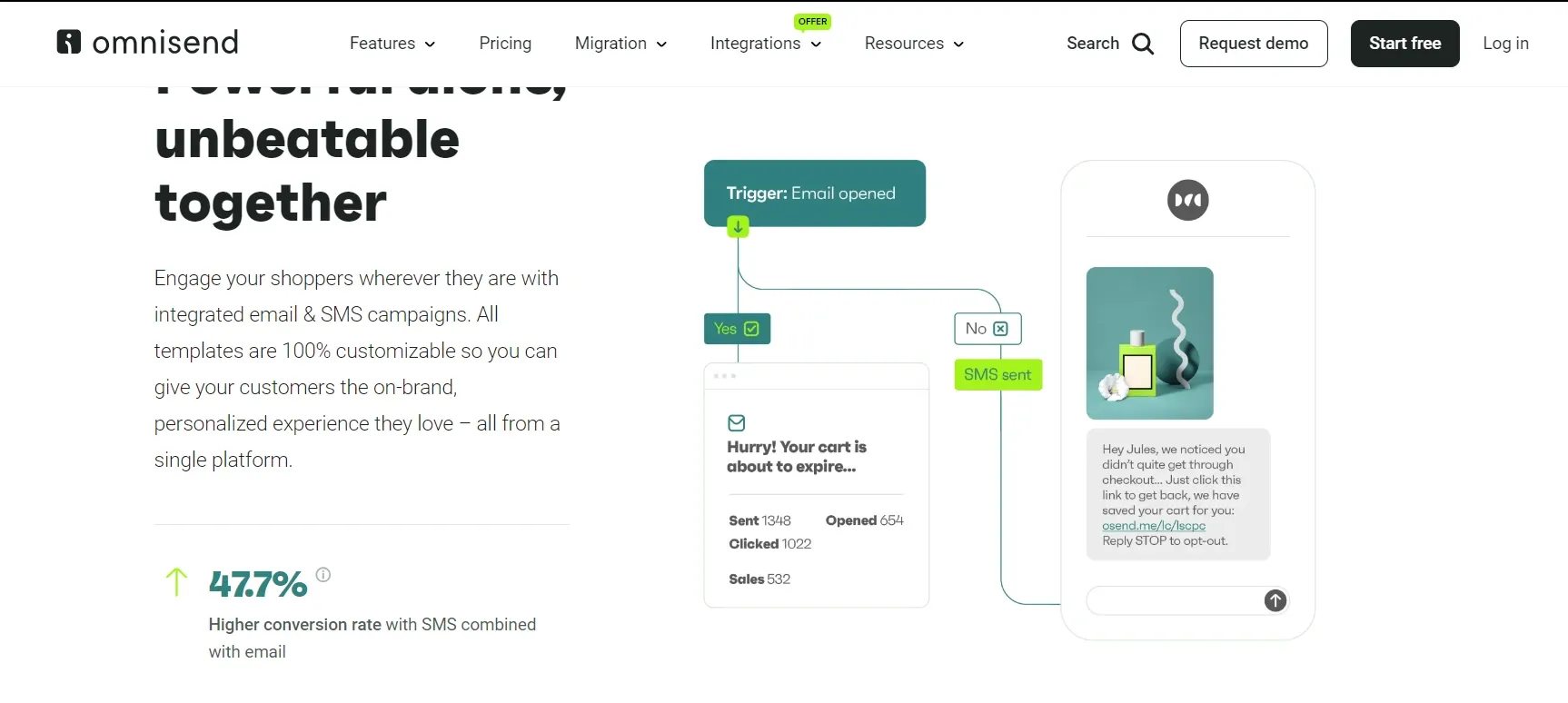
Pros
Let's look at the pros of Omnisend, one of the leading ecommerce marketing automation tools:
Multichannel marketing capabilities
Automated workflows for different customer segments
Integration with popular ecommerce platforms
Suggested Reading:Exploring Marketing Automation Hacks for Business Success
Cons
The following are the cons:
Limited customization options for templates
Pricing may be higher for businesses with larger contact lists
Pricing Details
Omnisend offers a flexible pricing model based on the number of contacts in your database. The tool provides a free plan for small businesses with limited features.
As your business grows, you can choose from various paid plans that offer additional functionalities such as advanced automation workflows and A/B testing capabilities. While the pricing may vary depending on your specific requirements, Omnisend strives to provide transparent and competitive pricing options.
Best Use Cases
Omnisend is particularly well-suited for ecommerce businesses looking to automate their marketing efforts and improve customer engagement. Whether you are launching a new product, running a seasonal promotion, or simply nurturing leads, Omnisend can help you create targeted campaigns that drive results.
The tool is ideal for businesses that value customization and personalization in their marketing strategies. Additionally, Omnisend's integration with popular ecommerce platforms makes it easy to synchronize customer data and streamline the marketing process.
Suggested Reading:Marketing Automation Best Practices for Small Businesses
Tool 6: Drip
Drip is a powerful ecommerce marketing automation tool that focuses on creating personalized customer experiences. It offers features like a visual workflow builder, segmentation options, and detailed analytics to help businesses optimize their marketing campaigns.
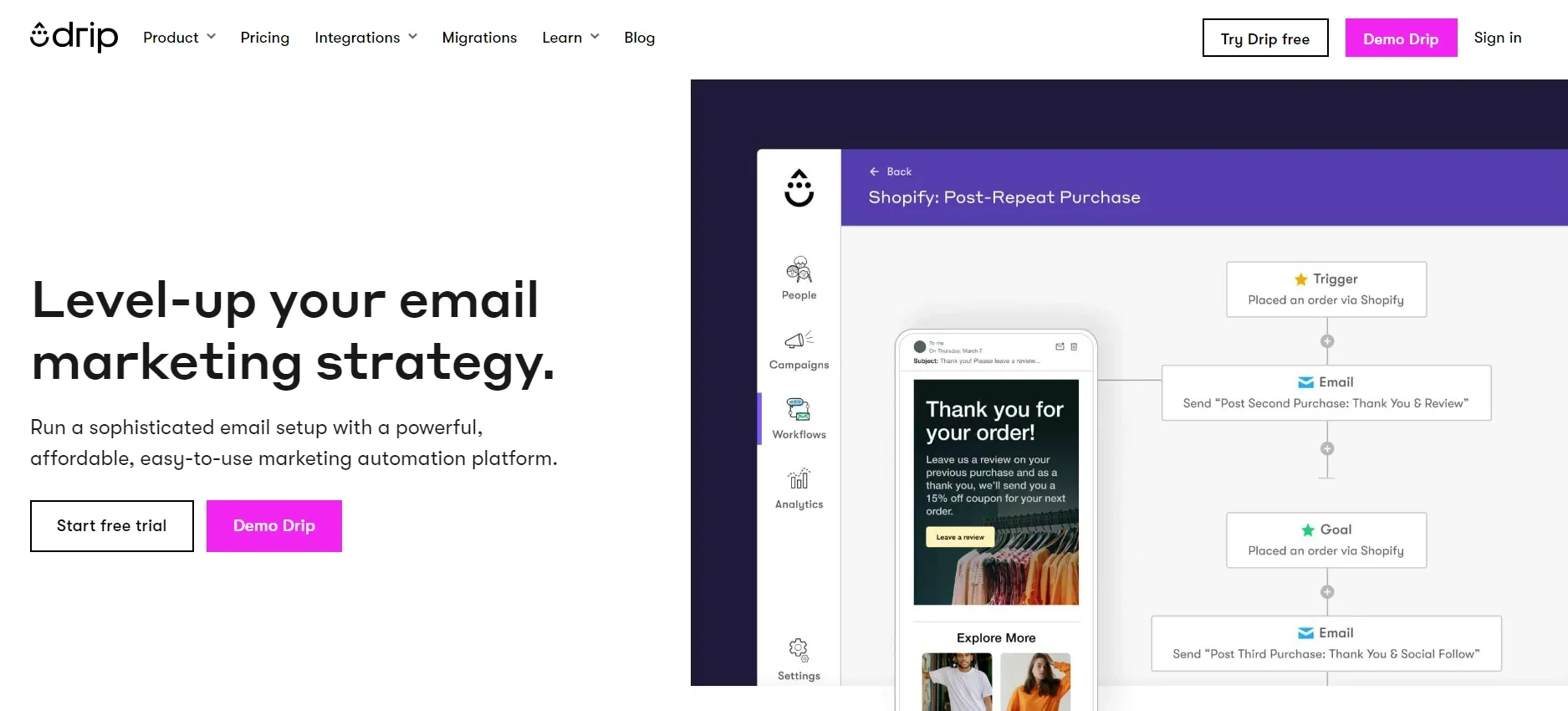
Pros
Let's look at the pros of Drip, one of the leading ecommerce marketing automation tools:
Visual automation builder for easy workflows
Advanced segmentation and personalization options
Integration with popular ecommerce platforms
Cons
The following are the cons:
Higher pricing compared to some competitors
The steeper learning curve for beginners
Pricing
Drip's pricing is based on the number of contacts in your database, with plans starting at $19 per month.
Best Use Cases
Drip is ideal for ecommerce businesses looking to create highly personalized marketing campaigns, automate customer journeys, and analyze campaign performance in detail.
Tool 7: Sendinblue
Sendinblue is an all-in-one ecommerce marketing automation platform that offers email marketing, SMS campaigns, and ecommerce marketing automation features for businesses.
It provides a user-friendly interface, customizable templates, and detailed reporting to help businesses optimize their marketing efforts.
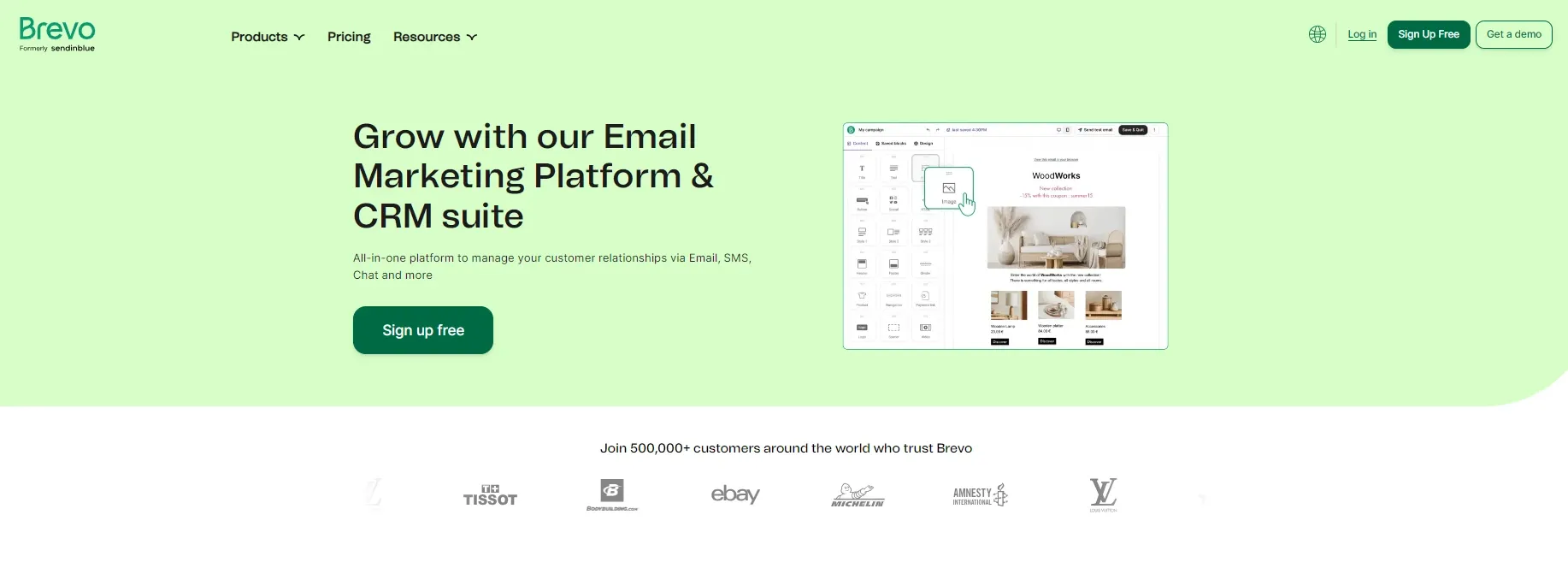
Pros
Let's look at the pros of Sensinblue, one of the leading ecommerce marketing automation tools:
Easy-to-use interface
Affordable pricing plans
Multichannel marketing capabilities
Cons
The following are the cons:
Automation features may be limited compared to specialized tools
Some advanced features may require higher-tier plans
Pricing
Sendinblue's pricing is based on the number of emails sent per month, with plans starting at $25 per month.
Best Use Cases
Sendinblue is suitable for small to medium-sized businesses looking for a cost-effective solution to manage their email marketing, SMS campaigns, and basic automation needs.
Tool 8: GetResponse
GetResponse is a comprehensive ecommerce marketing automation platform that offers email marketing, automation features, and landing page creation tools for businesses. It provides a range of templates, A/B testing options, and analytics to help businesses optimize their marketing campaigns.
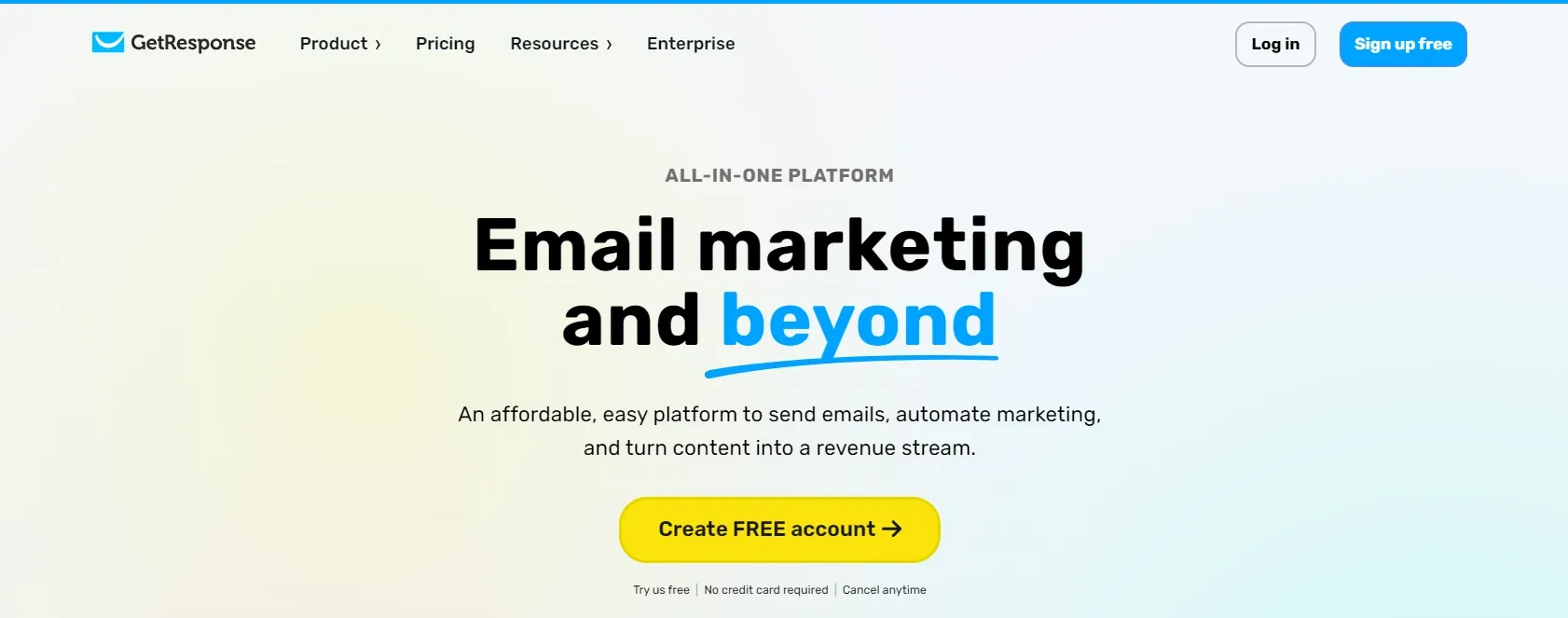
Pros
Let's look at the pros of GetResponse, one of the leading ecommerce marketing automation tools:
Wide range of templates for campaigns
A/B testing options for optimization
Integration with popular ecommerce platforms
Cons
The following are the cons:
Automation workflows may be less advanced compared to specialized tools
Pricing can be higher for businesses with larger contact lists
Pricing
GetResponse's pricing is based on the number of contacts in your database, with plans starting at $15 per month.
Best Use Cases
GetResponse is suitable for businesses looking for a comprehensive marketing platform with email marketing, automation features, and landing page creation tools to streamline their marketing efforts.
Tool 9: Moosend
Moosend is an intuitive email ecommerce marketing automation platform that also offers automation features for businesses. It provides a drag-and-drop editor, automation workflows, and detailed analytics to help businesses create targeted campaigns and track their performance effectively.
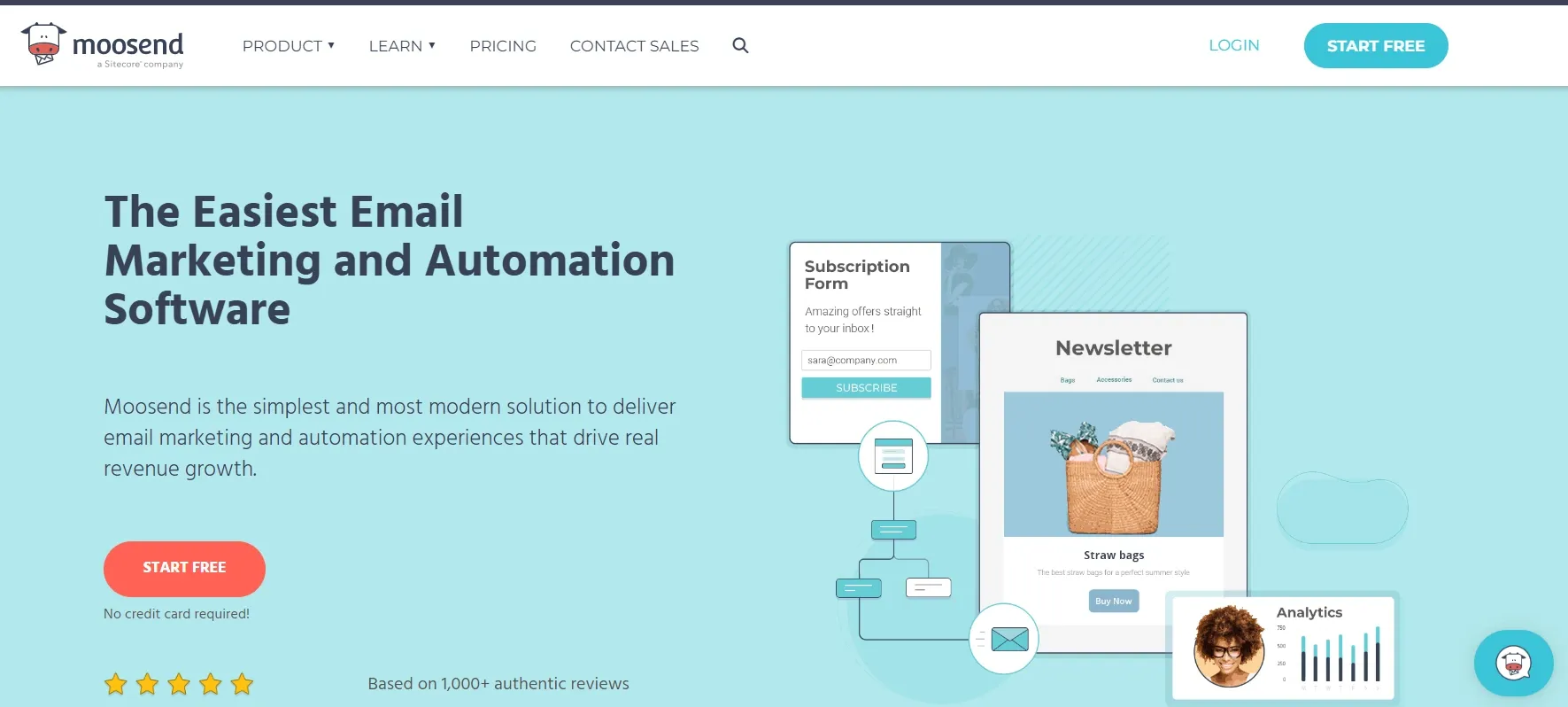
Pros
Let's look at the pros of Moosend, one of the leading ecommerce marketing automation tools:
User-friendly interface
Advanced automation capabilities
Affordable pricing plans
Cons
The following are the cons:
Limited customization options for templates
Some advanced features may require higher-tier plans
Pricing
Moosend's pricing is based on the number of subscribers in your database, with plans starting at $8 per month.
Best Use Cases
Moosend is suitable for businesses looking for an easy-to-use email marketing platform with advanced automation features to streamline their marketing campaigns and drive engagement with customers.
Tool 10: Salesforce Marketing Cloud
Salesforce Marketing Cloud is a comprehensive ecommerce marketing automation platform that offers a wide range of features for businesses. It provides tools for email marketing, social media management, customer journey mapping, and analytics to help businesses engage with their customers effectively.
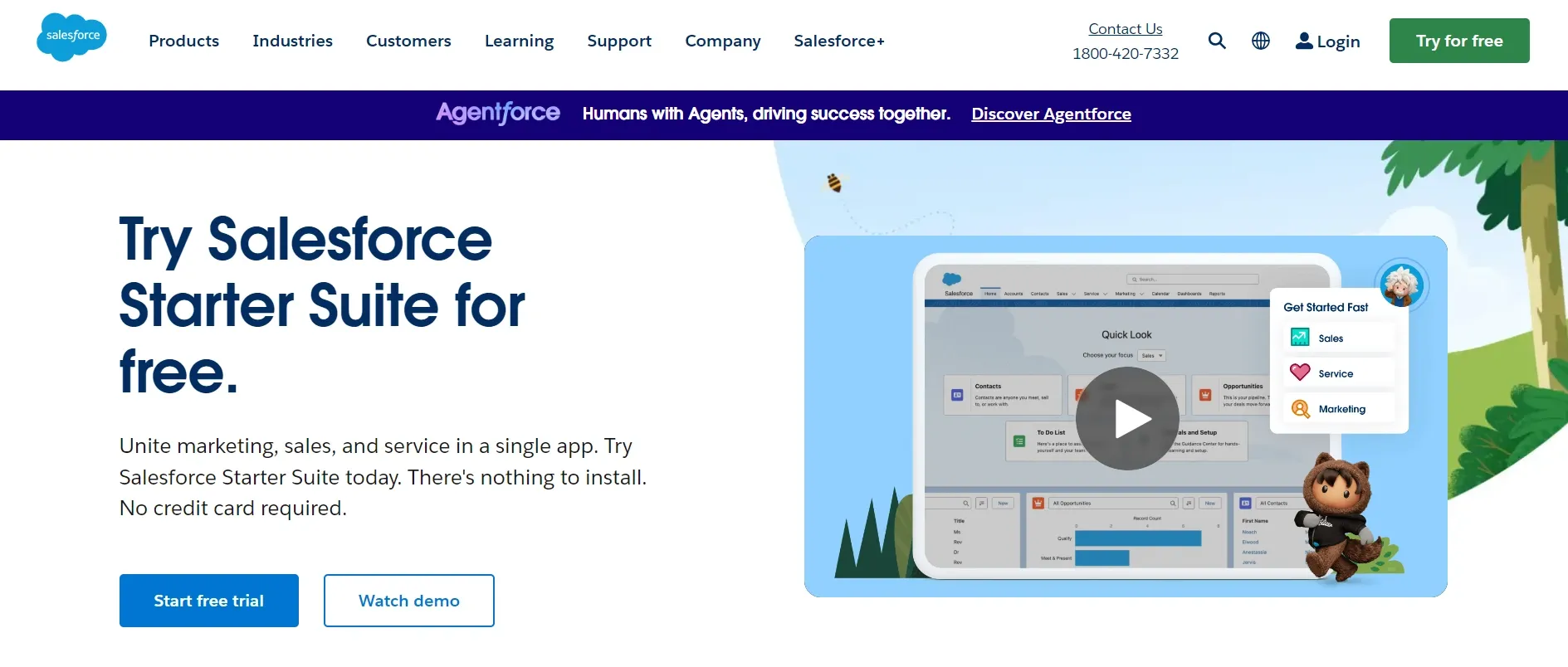
Pros
Let's look at the pros of Salesforce, one of the leading ecommerce marketing automation tools:
Extensive range of features for ecommerce marketing automation
Integration with Salesforce CRM
Advanced analytics and reporting capabilities
Suggested Reading:Choosing the Right Marketing Automation Software for Your Business
Cons
The following are the cons:
Higher pricing compared to some competitors
Complexity may be overwhelming for beginners
Pricing
Salesforce Marketing Cloud's pricing varies based on the specific features and customization options you require, with plans starting at $400 per month.
Best Use Cases
Salesforce Marketing Cloud is ideal for large enterprises looking for a comprehensive ecommerce marketing automation platform with advanced features, integration with CRM systems, and detailed analytics to optimize their marketing efforts.
Conclusion
In conclusion, picking the right ecommerce marketing automation tool will make you the maestro of conducting a symphony of sales and satisfied customers. It’s about getting savvy with tech that does the grunt work, so you can focus on what you do best – growing your empire. Choose wisely, and let the automation revolution supercharge your virtual storefront.
You may have a closer look at each of the options from the list given above and choose the best one suited to your needs. Always remember, the key to success is not just choosing the right tool, but using it effectively to achieve your marketing goals.
Whether you’re automating emails, managing customer journeys, or tracking sales, these top 10 tools of 2024 will help you scale with ease.
So stop procrastinating and sign up with any of the tools above to watch your business thrive on autopilot! If you're still confused, just sign up with the free plan for BotPenguin and then make up your mind!
Frequently Asked Question(FAQs)
Is ecommerce marketing automation expensive?
Costs vary, but many tools offer free plans or tiers for smaller stores.
What are the best ecommerce marketing automation features for ecommerce?
Look for abandoned cart recovery, product recommendations, and segmentation.
Can automation replace my ecommerce marketing team?
No, it frees them for creative tasks and strategy, but human expertise remains key.
How do I choose the right ecommerce marketing automation tool?
Consider budget, features, integrations, and ease of use for your team's skill level.
Are there e-commerce marketing automation tools specifically for ecommerce?
Yes, several platforms cater to ecommerce with features like SMS marketing and product behavior tracking.
State the benefit of using ecommerce marketing automation on.
Increased sales, improved customer engagement, and personalized experiences at scale.

